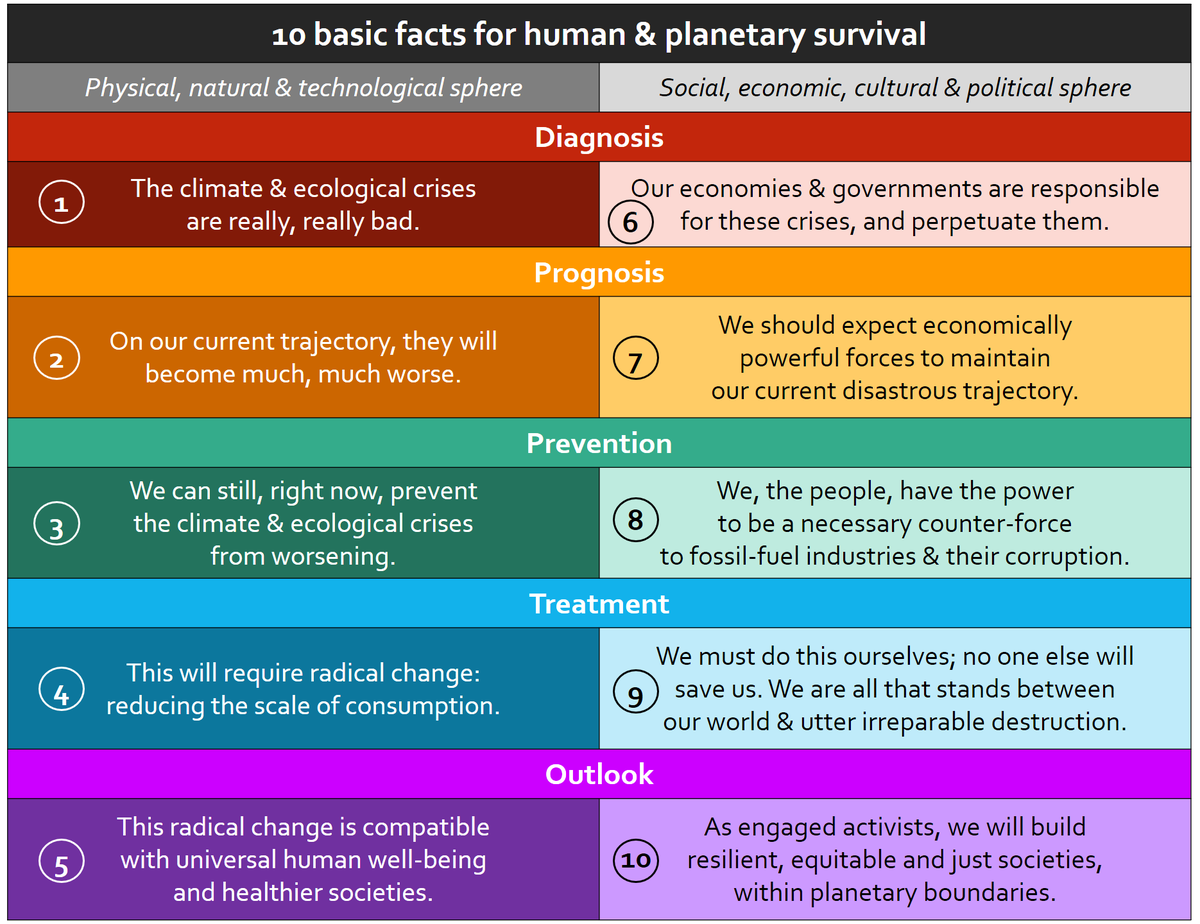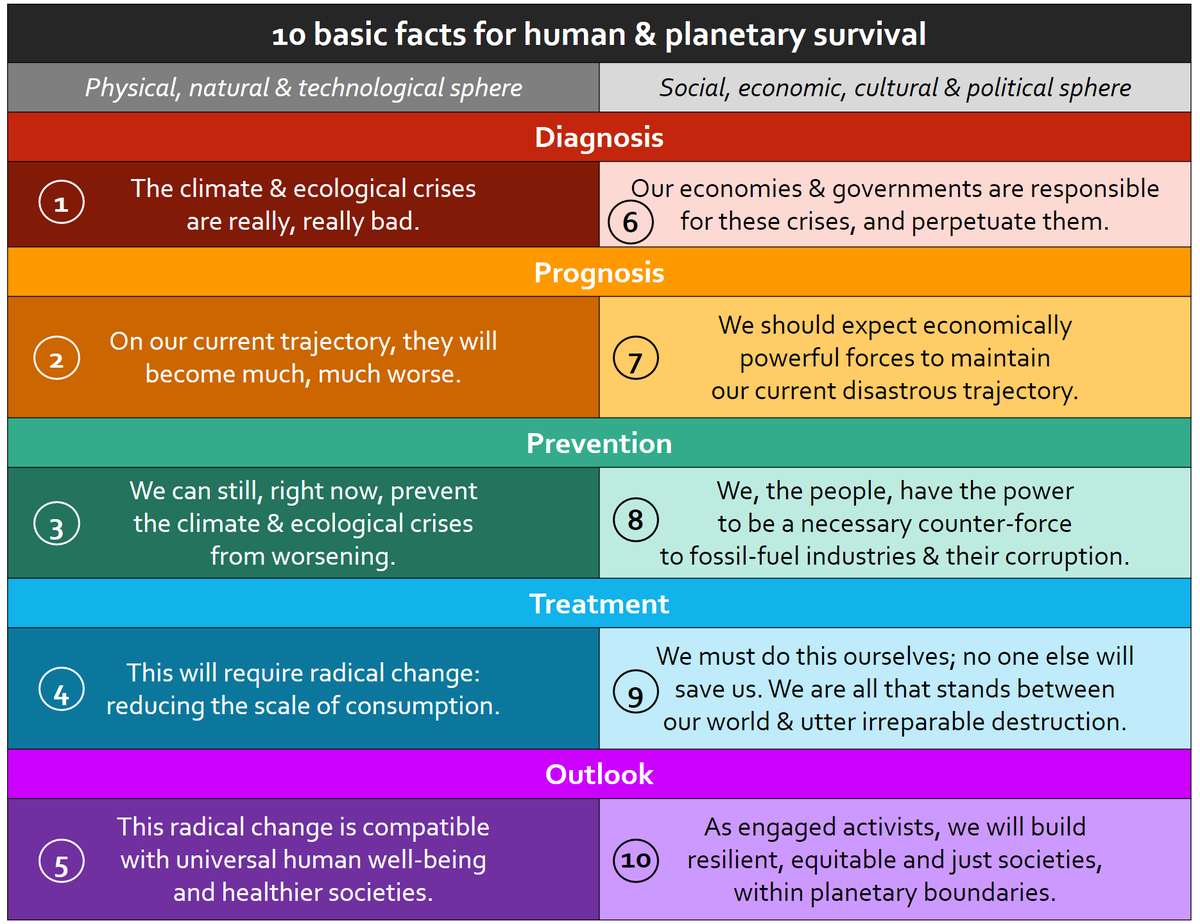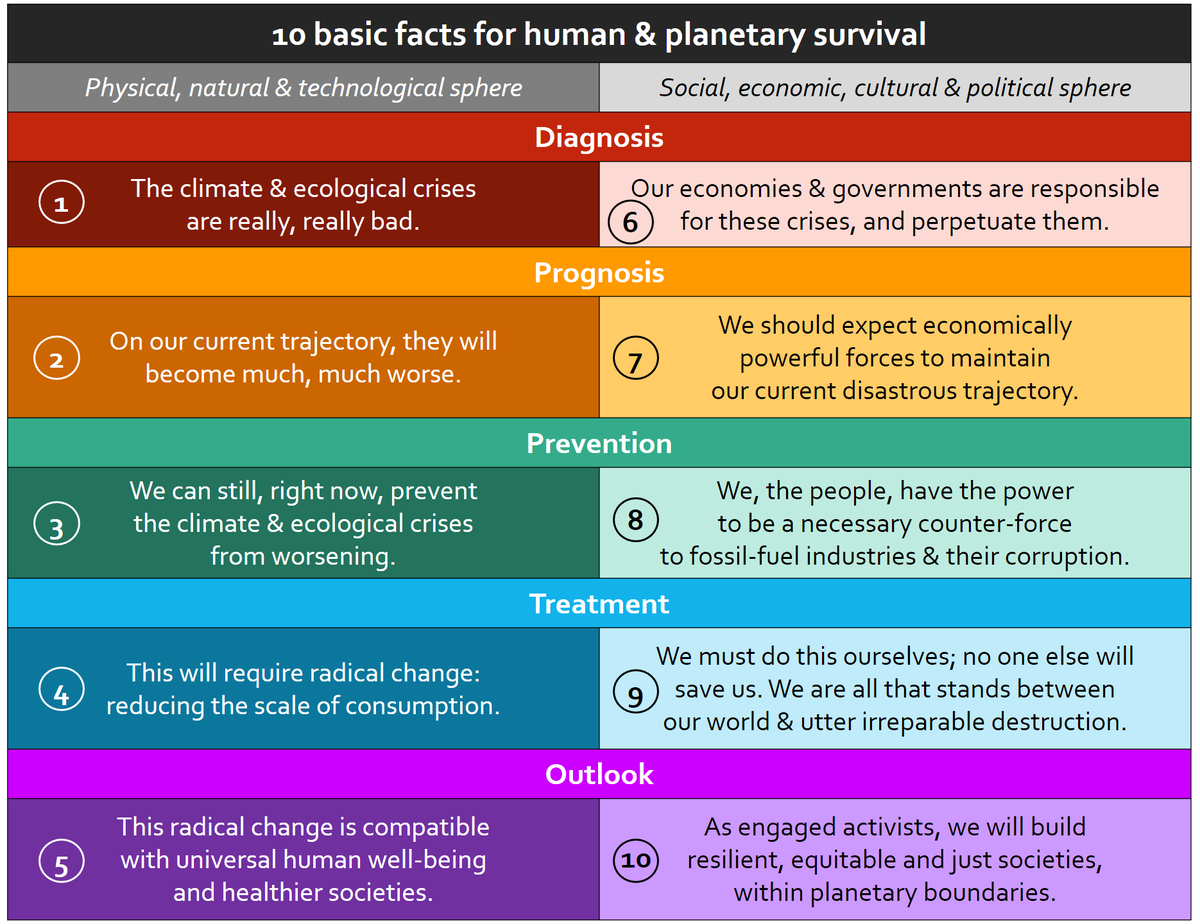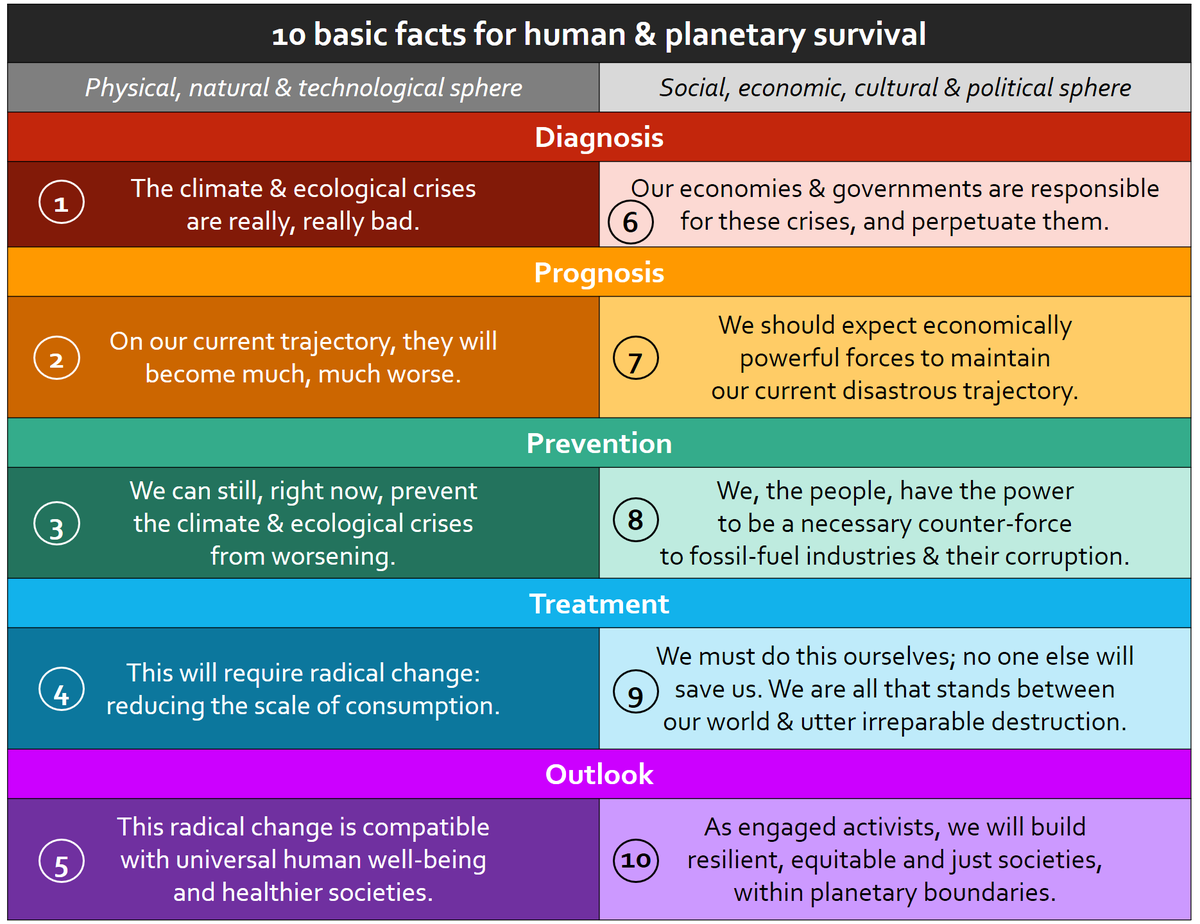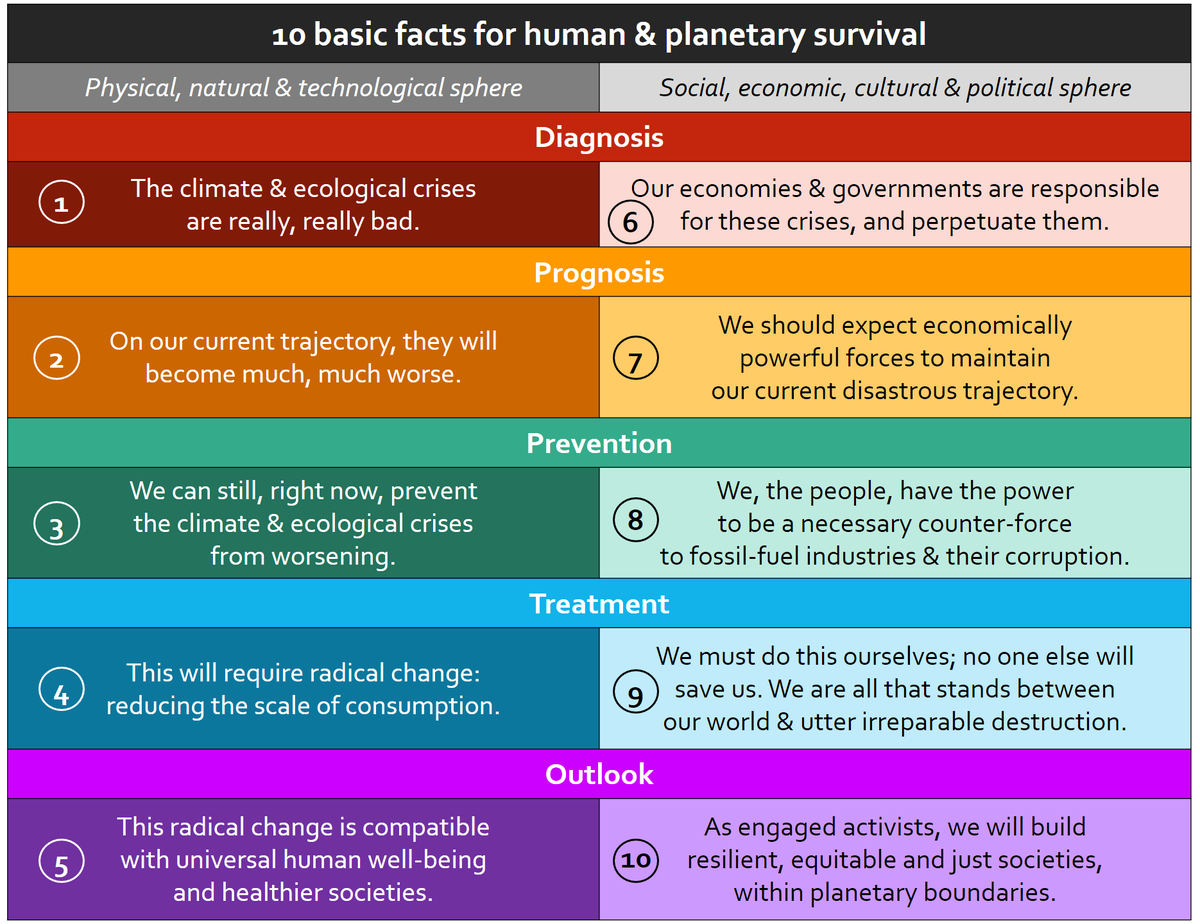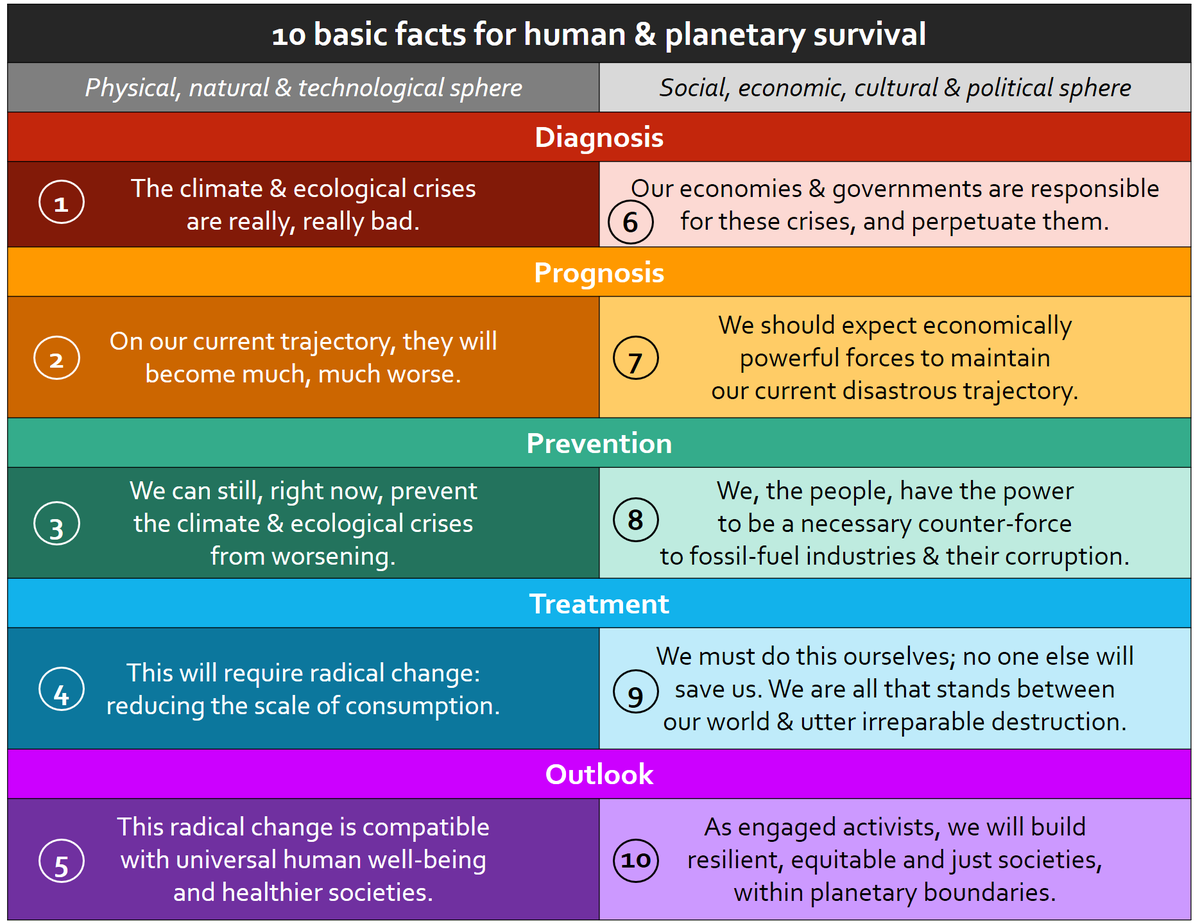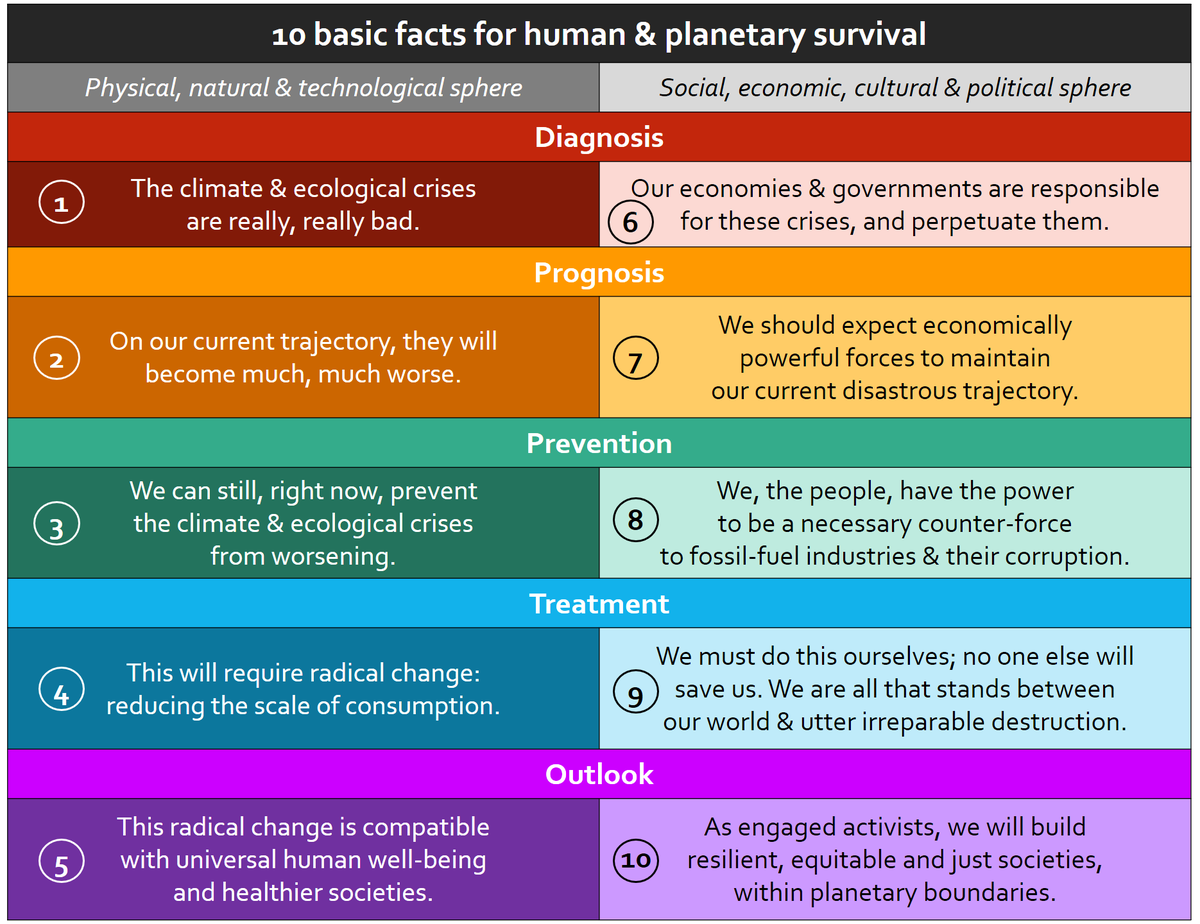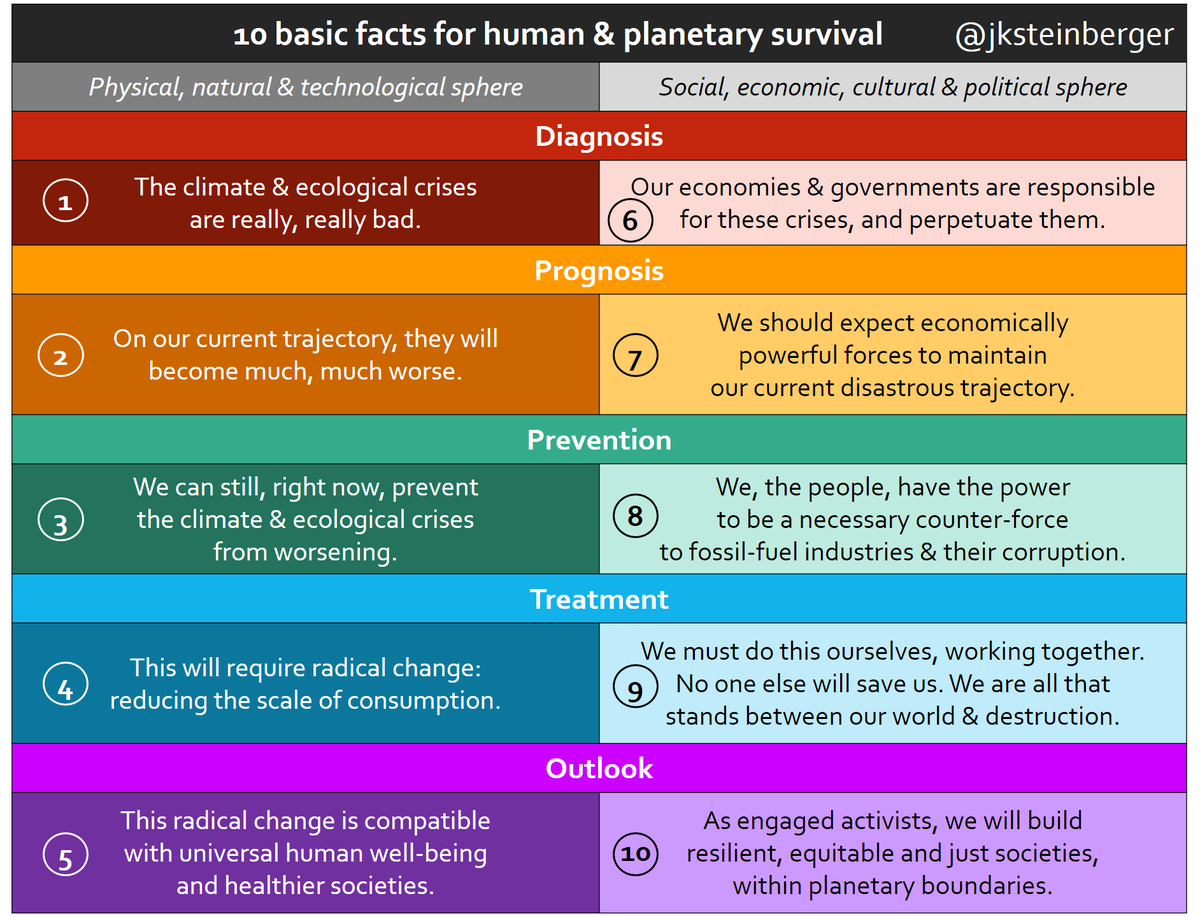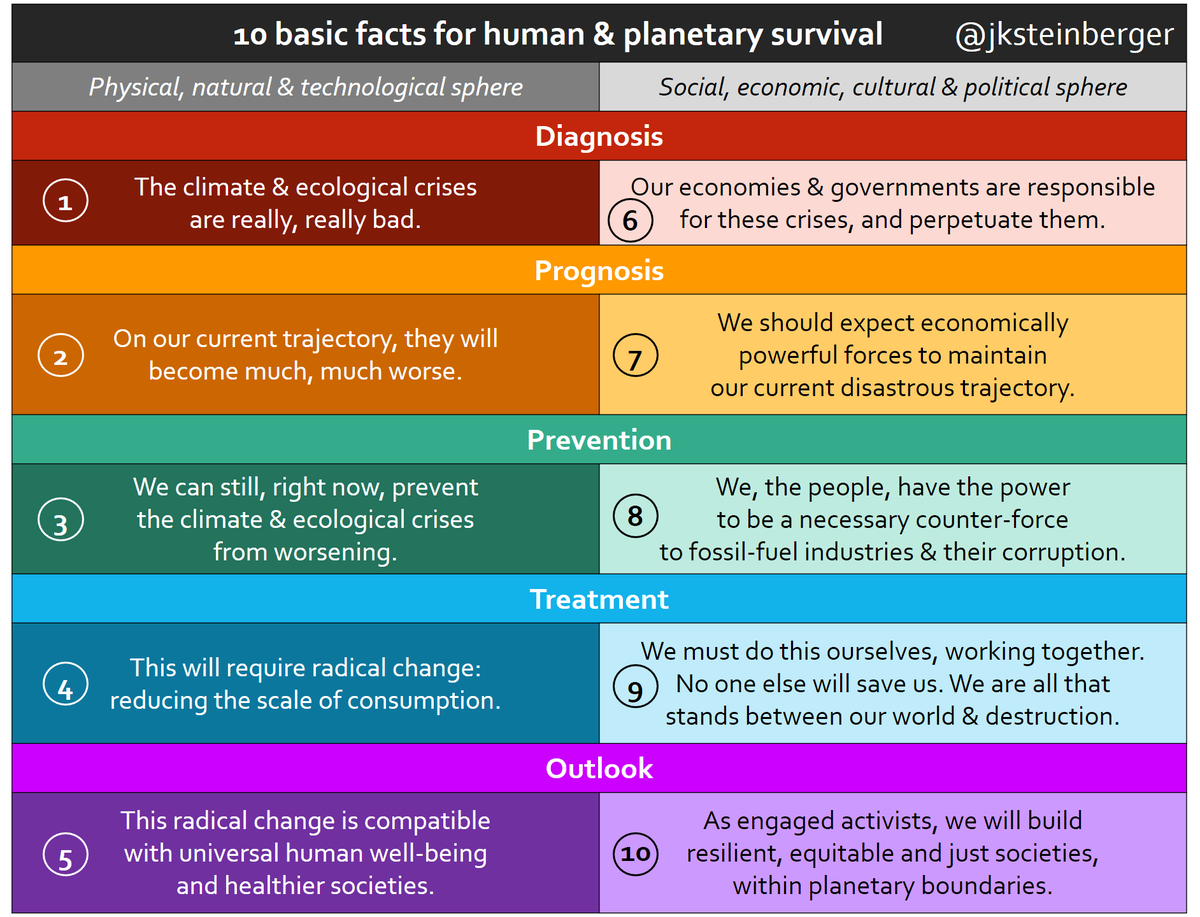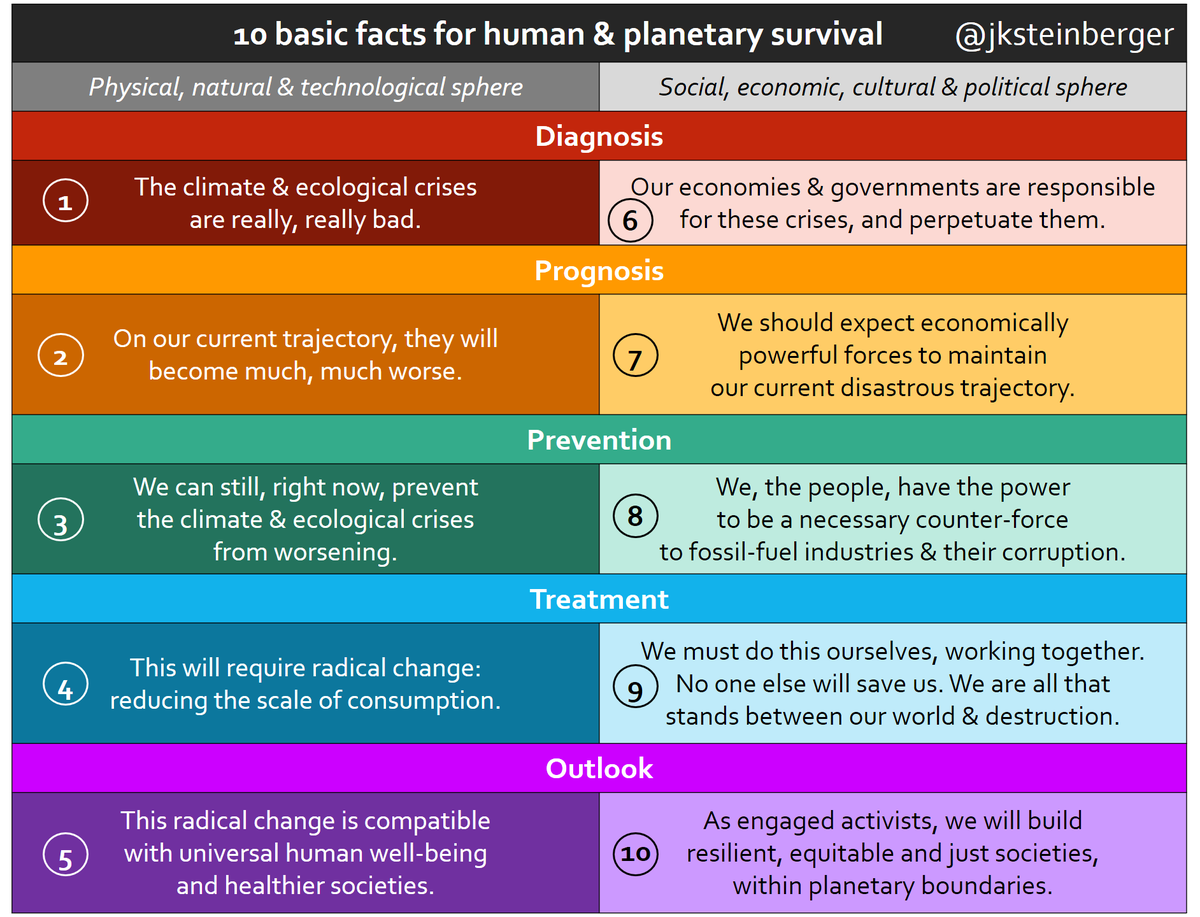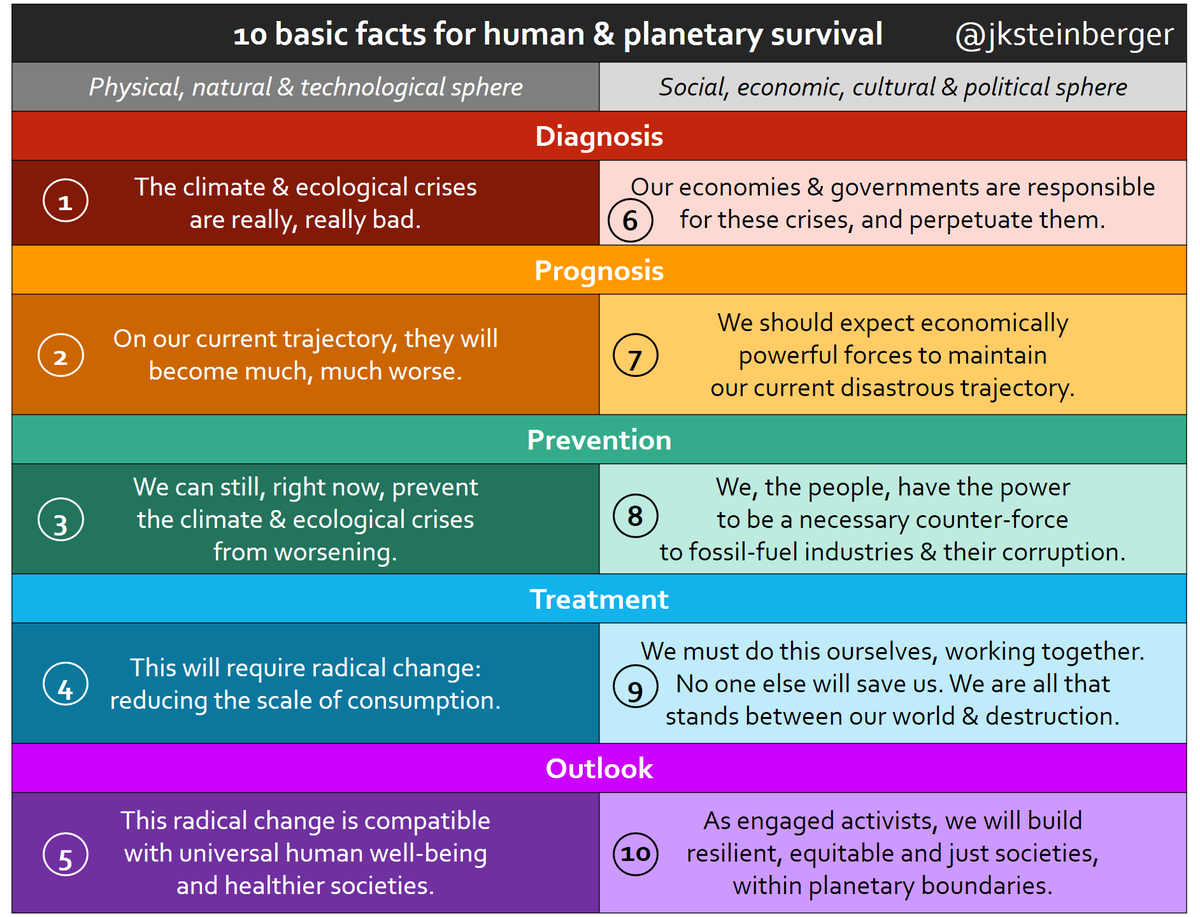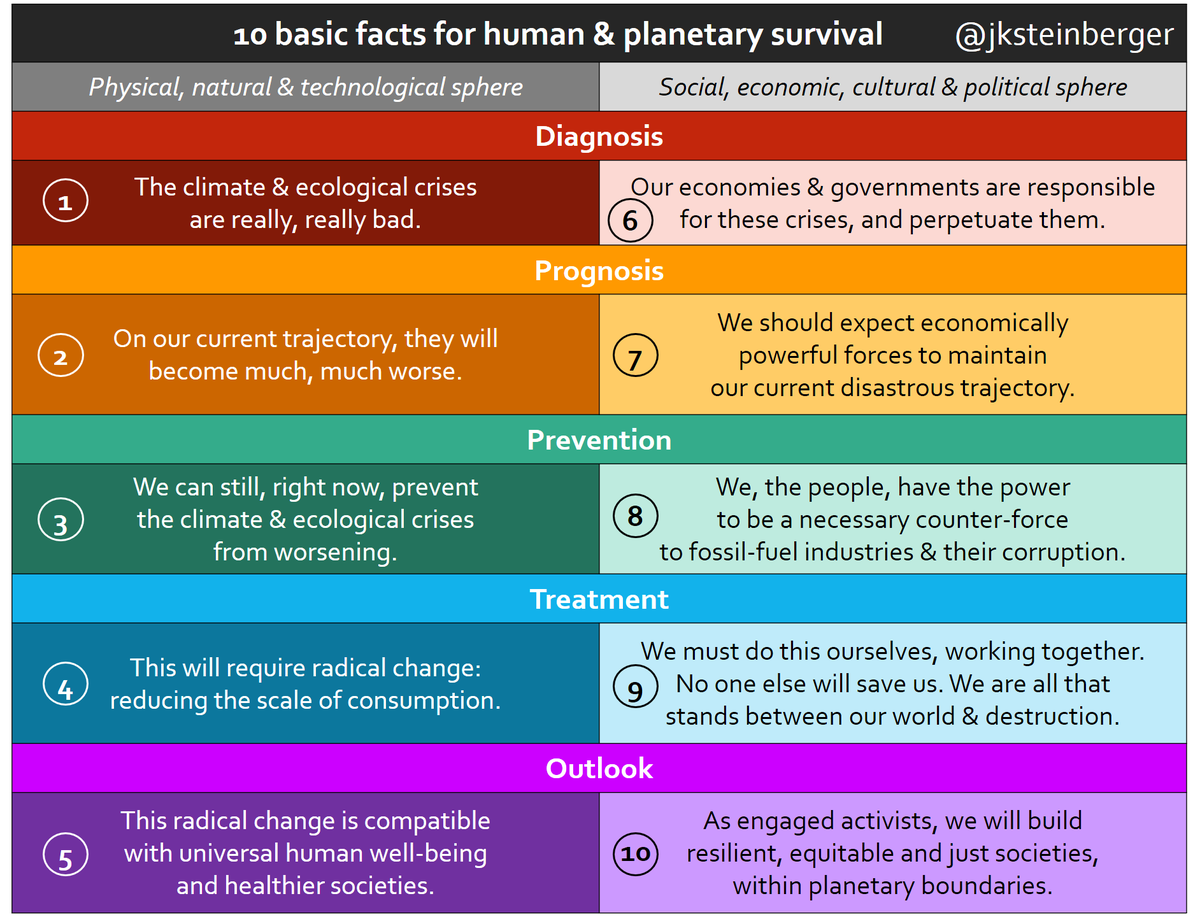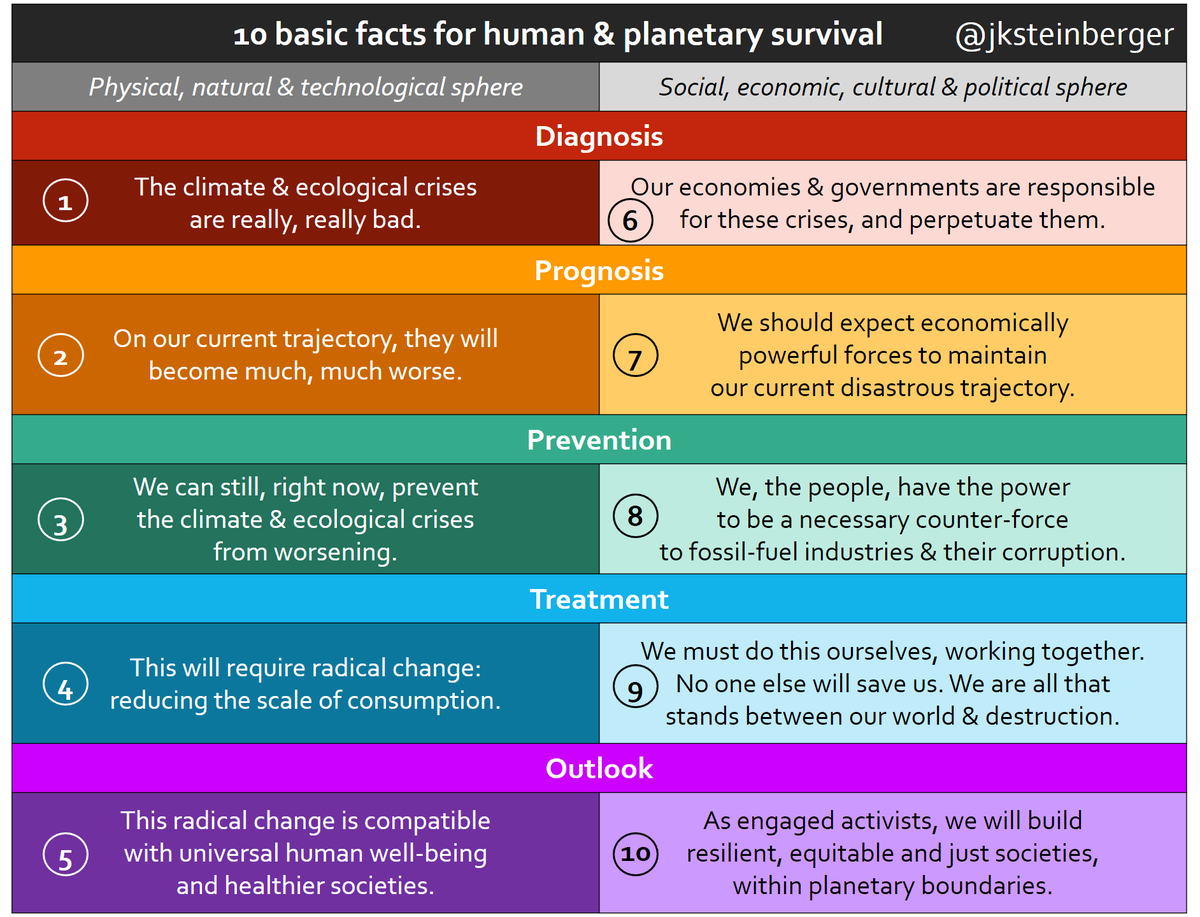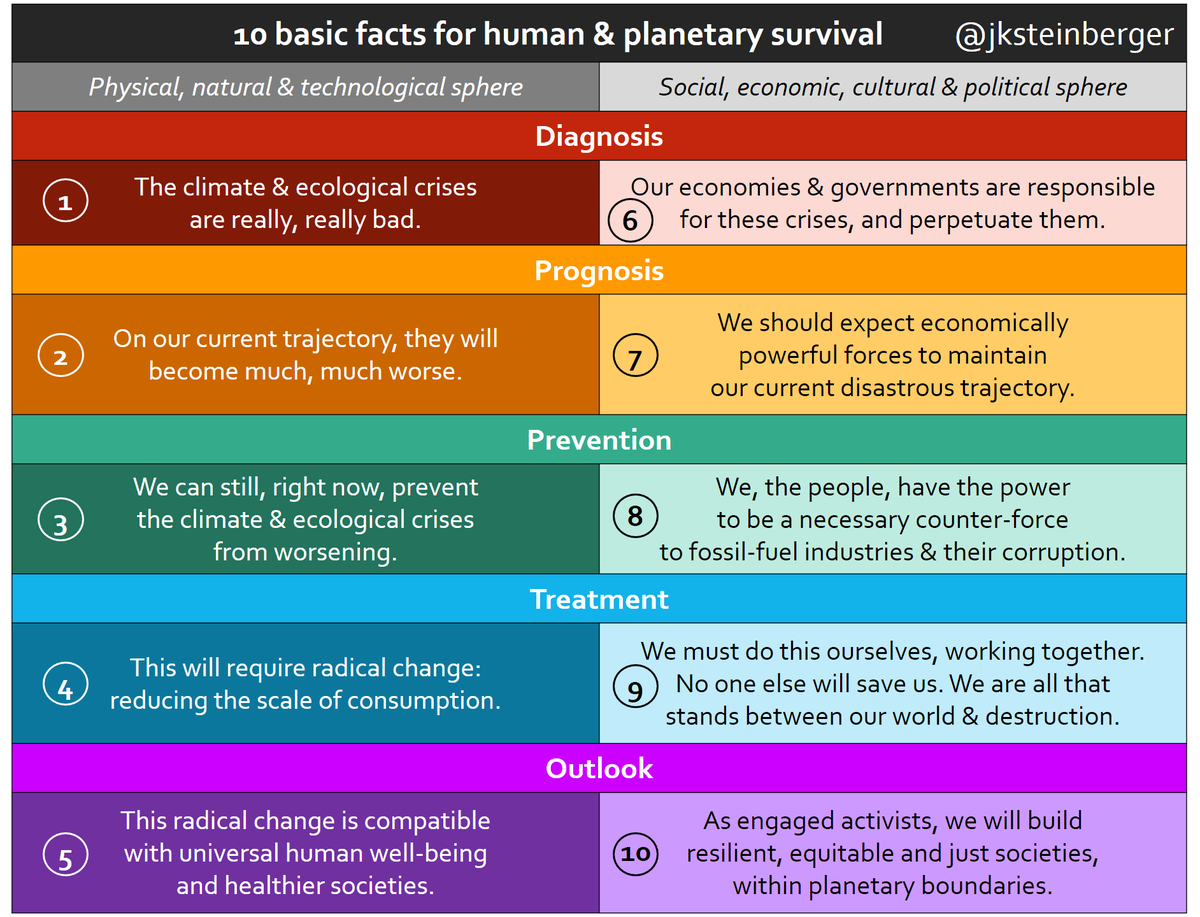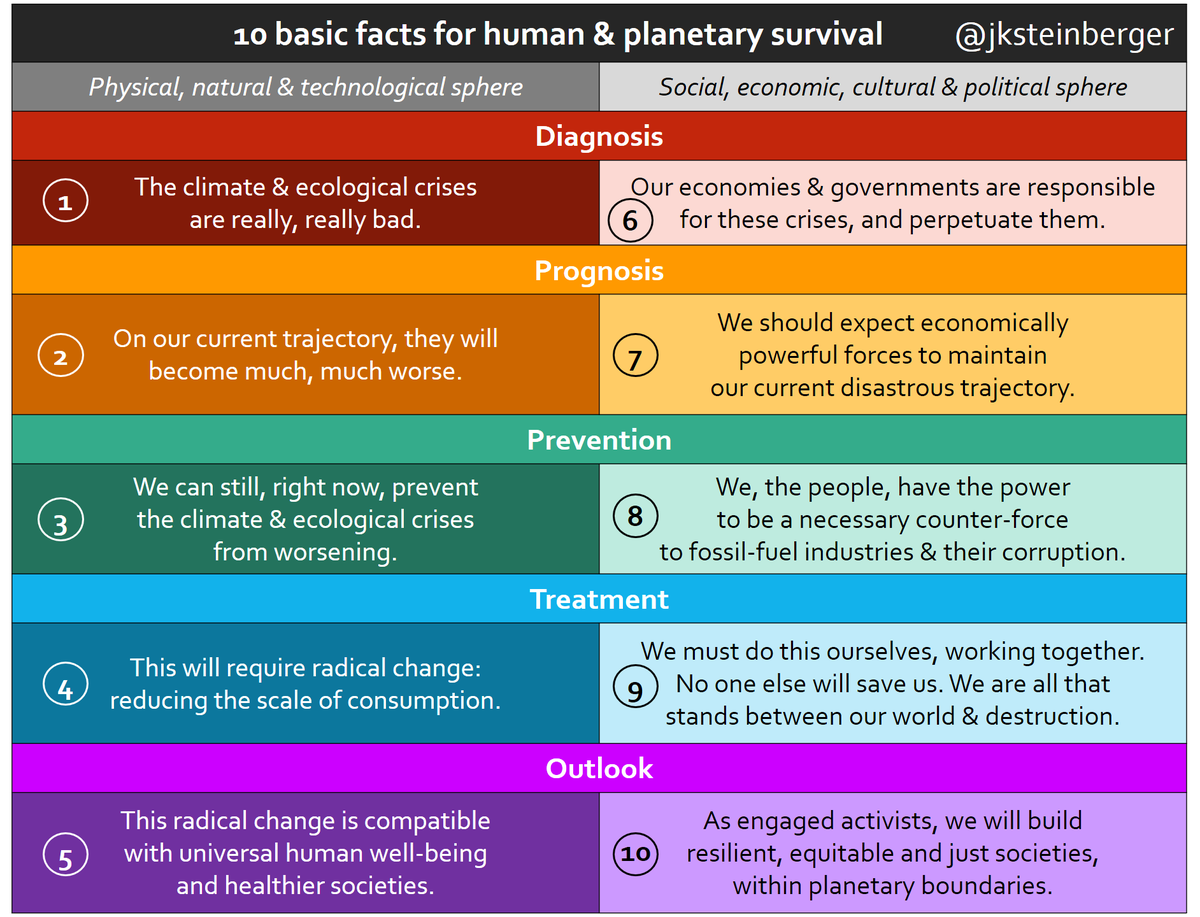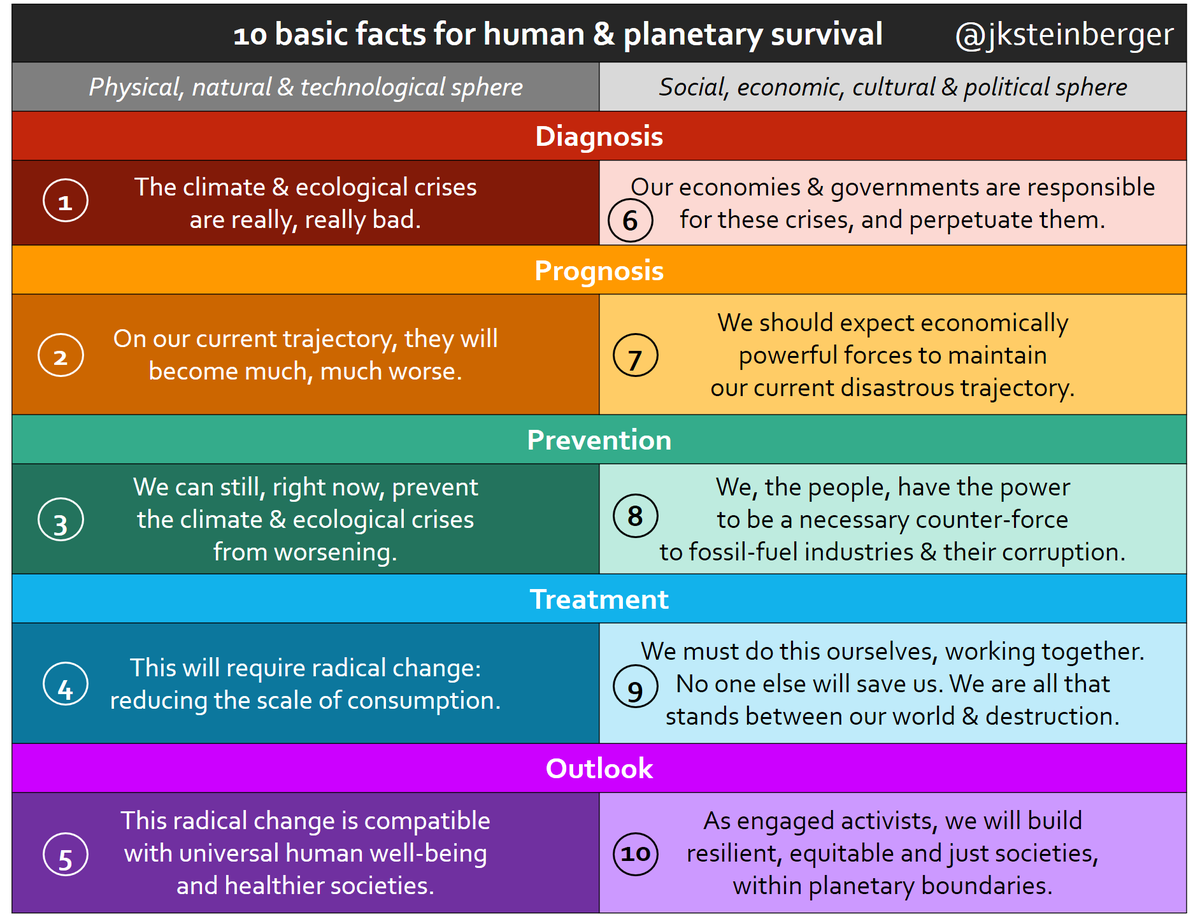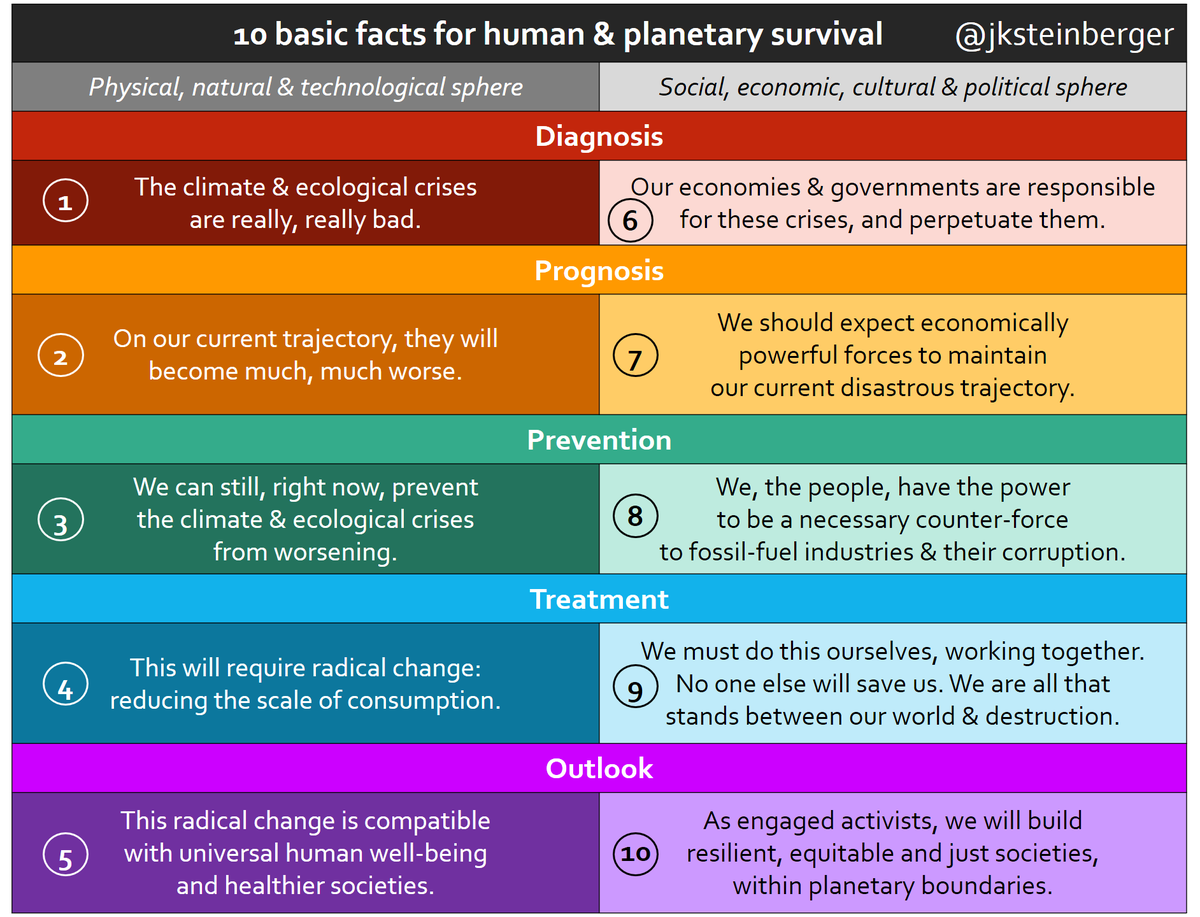Hi all, woke up in the middle of the night full of climate/ecocide/world war/refugee etc angst, and decided to make lemonade, in this case a pretty diagram of my "10 basic facts for human & planetary survival." I hope you like it.
It's literally the most advanced graphical design I have ever done (colleagues can attest to this). If you find it horrible or unbearable or in need of, shall we say, improvements, please be kind and make polite suggestions. I'm much more confident on the contents. 

After a cup of tea (and putting on a load of laundry, the life of the academic mom is ever so glamorous, you know), I'll add a thread of what the domains and their overlaps mean in terms of knowledge, key references and work to do. But I wanted to share the pretty picture first!
Hello again everyone!
 First a typo-corrected version of the #RainbowDiagramToSaveEarth (that hashtag's definitely going to catch on.
First a typo-corrected version of the #RainbowDiagramToSaveEarth (that hashtag's definitely going to catch on. No doubt.)
No doubt.)
 Next, a thread of what these domains mean.
Next, a thread of what these domains mean.
 I'm going to call this tweet 1/ since I didn't number the others. Breaking rules!
I'm going to call this tweet 1/ since I didn't number the others. Breaking rules!
 First a typo-corrected version of the #RainbowDiagramToSaveEarth (that hashtag's definitely going to catch on.
First a typo-corrected version of the #RainbowDiagramToSaveEarth (that hashtag's definitely going to catch on. No doubt.)
No doubt.) Next, a thread of what these domains mean.
Next, a thread of what these domains mean.  I'm going to call this tweet 1/ since I didn't number the others. Breaking rules!
I'm going to call this tweet 1/ since I didn't number the others. Breaking rules!
(1) This is the domain of the IPCC and other large research assessment reports. So much evidence, just a few links.
SR1.5 : https://www.ipcc.ch/sr15/
SROCC: https://www.ipcc.ch/srocc/
SRCCL: https://www.ipcc.ch/srccl/
IPBES: https://ipbes.net/global-assessment-report-biodiversity-ecosystem-services
WWF: https://www.wwf.org.uk/updates/living-planet-report-2018
2/
SR1.5 : https://www.ipcc.ch/sr15/
SROCC: https://www.ipcc.ch/srocc/
SRCCL: https://www.ipcc.ch/srccl/
IPBES: https://ipbes.net/global-assessment-report-biodiversity-ecosystem-services
WWF: https://www.wwf.org.uk/updates/living-planet-report-2018
2/
[I'm going to keep posting the diagram so I don't have to copy-paste the text and you don't forget what the numbers mean. Sorry if it's repetitive.]
(2) Future projections are given by the same reports as above. They are extremely, extremely worrying. Dire. Awful. Not. Good.
3/
(2) Future projections are given by the same reports as above. They are extremely, extremely worrying. Dire. Awful. Not. Good.
3/
(3) is where things get interesting, because a lot hinges on what is considered "feasible" in polite scientific-policy circles. Some people consider radical change "unfeasible." I'm not one of them - I'd much prefer planetary destruction to be "unfeasible," but it's not. So.
4/
4/
(3) cont.
So this is where subjectivity, rather than pure objective physical & natural science observations & modelling, enter the picture. I'll try to keep it simple and clean. If we stop emitting now, and I mean NOW, we stay below 1.5oC warming.
5/ https://twitter.com/CarbonBrief/status/1209025851343413248
So this is where subjectivity, rather than pure objective physical & natural science observations & modelling, enter the picture. I'll try to keep it simple and clean. If we stop emitting now, and I mean NOW, we stay below 1.5oC warming.
5/ https://twitter.com/CarbonBrief/status/1209025851343413248
Still (3)
If we do this, and remember, all this requires is our *not* emitting, not the invention of new technologies or whatever, we can limit warming and hence limit the climate & ecological crises from engulfing much more than on our current growth trajectory.
6/
If we do this, and remember, all this requires is our *not* emitting, not the invention of new technologies or whatever, we can limit warming and hence limit the climate & ecological crises from engulfing much more than on our current growth trajectory.
6/
(4) There is no doubt whatsoever that reducing emissions at the rate of at least 15% per year constitutes radical change. The IPCC reports agree on this point as well, speaking of "transformations" rather than "transitions" required to remain within 1.5oC.
7/
7/
(4) cont.
Does radical change mean reducing consumption? Everyone agrees it means *changing* consumption, away from fossil energy and land-based resources, towards renewable energy, electricity-based technologies, plant-based diets. Will that be enough?
8/
Does radical change mean reducing consumption? Everyone agrees it means *changing* consumption, away from fossil energy and land-based resources, towards renewable energy, electricity-based technologies, plant-based diets. Will that be enough?
8/
(4) cont.
Long story short? No. Doing all we can to stop deadly planetary devastation will require both *changing* and *reducing* consumption. See UK CCC Net-Zero report: lots of supply-side change, but still some demand measures.
9/ https://www.theccc.org.uk/publication/net-zero-the-uks-contribution-to-stopping-global-warming/
Long story short? No. Doing all we can to stop deadly planetary devastation will require both *changing* and *reducing* consumption. See UK CCC Net-Zero report: lots of supply-side change, but still some demand measures.
9/ https://www.theccc.org.uk/publication/net-zero-the-uks-contribution-to-stopping-global-warming/
(4) cont.
I decided to stop waffling and go straight to demand reductions because I think it's the crux of much hesitation and inaction, and I'd rather deal with it full frontally, and also because why the heck would we not all we can to avoid planetary disaster? Come on.
10/
I decided to stop waffling and go straight to demand reductions because I think it's the crux of much hesitation and inaction, and I'd rather deal with it full frontally, and also because why the heck would we not all we can to avoid planetary disaster? Come on.
10/
(4) cont. This is getting too long! I understand that some (many? most?) people might disagree with (4). My point is that reductions in consumption should be openly discussed, since they are (a) effective, (b) possible, and (c) necessary. Onwards.
10/
10/
[Aside: no wonder this thread is getting too long! Myself & colleagues are basically writing a book about this, and I need to keep myself from just copy-pasting it on twitter. You can pre-order your copy ... - who am I kidding, at this rate I'll never finish it. Back to  .] 11/
.] 11/
 .] 11/
.] 11/
(5) is where things get interesting because this is my research area. Woohoo! But I'm not alone. Rao, Min & Mastrucci recently published this great article on "Energy requirements for decent living in India, Brazil and South Africa" in Nature Energy.
https://www.nature.com/articles/s41560-019-0497-9
12/
https://www.nature.com/articles/s41560-019-0497-9
12/
[Break to start the day. Will be back, probably tomorrow night in the wee hours. Take care everyone. Be nice to each other except if the others are fossil fuel execs or warmongering disaster capitalists, in which case feel free to THWART THEIR DEATH EATER DREAMS.] 14/ I guess.
Hi all, thanks for reading, apologies for unfinished threads and thought, just popping up to say 2 things:
Thing 1: this diagram is not yet explicitly decolonized. It is *in my mind* but my mind is not yet very good at being clear on this. I'm work in progress too. 15/
Thing 1: this diagram is not yet explicitly decolonized. It is *in my mind* but my mind is not yet very good at being clear on this. I'm work in progress too. 15/
Thing 2: the 9th item, "We must do this ourselves" is poorly written. I don't mean we must do it as individuals, retreating to a nice cave to meditate or wev. I mean we must do it as collective action. Sorry about that. No nice cave for you. Back to the barricades! 16/
Or in my case, of course, tea and laundry,  +
+ . Did you know twitter had a laundry basket emoticon?!? Well now you do. What the actual heck. 17/
. Did you know twitter had a laundry basket emoticon?!? Well now you do. What the actual heck. 17/
 +
+ . Did you know twitter had a laundry basket emoticon?!? Well now you do. What the actual heck. 17/
. Did you know twitter had a laundry basket emoticon?!? Well now you do. What the actual heck. 17/
Sunday January 5th 2019. The Saga continues, as it usually does around here, with footnotes to the previous chapters (definitealy doing twitter right), because quite a few people had important contributions. So this is already a slightly revised version of The Diagram. 18/
@anlomedad said that (4) needs more explanation, in terms of explaining why consumption has to decrease, not just change (i.e. including impacts of mineral & biomass use in "low carbon" technologies). I agree but this would take up too much space here. 19/
https://twitter.com/anlomedad/status/1213344741770838016
https://twitter.com/anlomedad/status/1213344741770838016
So I'm just going to leave it as a fact for now, with backup for later. Next, still on (4), @FHeitzendorfer (and also others) pointed out that "we" is too broad. I agree: underconsumption and deprivation exist in many countries (incl US & UK). 20/
https://twitter.com/FHeitzendorfer/status/1213368888169238534
https://twitter.com/FHeitzendorfer/status/1213368888169238534
So (4) is differentiated by income and need levels. Some groups need to consumer much more than they currently do, and many groups, especially the globally wealthy, need to reduce their consumption A LOT. Inequality is a core focus here.
https://journals.sagepub.com/doi/full/10.1177/2329496517704872
21/
https://journals.sagepub.com/doi/full/10.1177/2329496517704872
21/
I should mention that (4) is of course the core domain of degrowth economics, whose main theorist and proponent is the tremendous Giorgos Kallis, @g_kallis , and you should all follow him and read his books.
https://en.wikipedia.org/wiki/Giorgos_Kallis
22/
https://en.wikipedia.org/wiki/Giorgos_Kallis
22/
Next, footnotes to (5). Gawd help us. The main comments here were that people were not, as a mass, clamoring for lower consumption. But that's not what (5) says: (5) states universal well-being is *possible* at much lower consumption levels. So this is a scientific fact, ... 23/
... not a majority political aspiration (yet). And this is where the 2nd socio-economic column is important: it explains my view of *why* we have to fight consumerism full-frontally: because it's the means fossil-fueled industries use to accumulate wealth and power. 24/
So that's a good jump-off point to talk about (6). I've been writing about (6) a lot, and so have other people. Some of the main references can be found in this google doc (page 3, under "climate & capitalism"). @NaomiAKlein is a core thinker here.
https://drive.google.com/open?id=15wu0HlmsTdgepFMzNXeq4xGHclF9fZPZ
24/
https://drive.google.com/open?id=15wu0HlmsTdgepFMzNXeq4xGHclF9fZPZ
24/
So are Andreas Malm, Ian Gough, Kate Raworth.
In terms of my own contributions to (6), they are mainly this article with @elkepirgmaier :
https://www.mdpi.com/2071-1050/11/7/2001/htm
and a nice short blog on climate breakdown, capitalism and democracy:
https://medium.com/@JKSteinberger/climate-breakdown-capitalism-and-democracy-e11b16c7d9ef
25/
In terms of my own contributions to (6), they are mainly this article with @elkepirgmaier :
https://www.mdpi.com/2071-1050/11/7/2001/htm
and a nice short blog on climate breakdown, capitalism and democracy:
https://medium.com/@JKSteinberger/climate-breakdown-capitalism-and-democracy-e11b16c7d9ef
25/
Moving on to (7), the core references are mainly the same as for (6): understanding how fossil capitalism emerges from the industrial revolution means that we need to see our societies as captive prey of the political economy they have created. I tried to express this here... 26/
"The fossil giants and their adjacent industries, such as automotive & aviation, represent our current capitalist system. Our infrastructure and cities are built for them, our markets function for them, our governments are in thrall to them."
https://medium.com/@JKSteinberger/climate-breakdown-capitalism-and-democracy-e11b16c7d9ef
27/
https://medium.com/@JKSteinberger/climate-breakdown-capitalism-and-democracy-e11b16c7d9ef
27/
The question becomes: what can we do about this? And this is where understanding the origins of capitalism and wealth accumulation, including the origins of consumerism as a creation of corporate firms (see the excellent "Century of the Self") helps. 28/
Because we have to unlearn (and fast) a vision of humanity as grasping, greedy, selfish, competing ever upwards: that vision itself turns us into a product, a tool of profit accumulation. It turns us into consumers. Moving away from this view of ourselves is essential for (8).29/
I have ideas why this is: probably because our democracies are the uneasy compromise between corporate wealth accumulation and preventing popular uprisings, or because teaching the power of organizing to teenagers is a downright scary proposition. Who knows. 31/
[Another break to start the day - but hopefully that was enough reading to keep you going until tomorrow. Go out & enjoy the world and its people & creatures as well! Or thwart the dreams of the fossil exec and warmongering disaster capitalist death eaters. That works too.] 33/

 Read on Twitter
Read on Twitter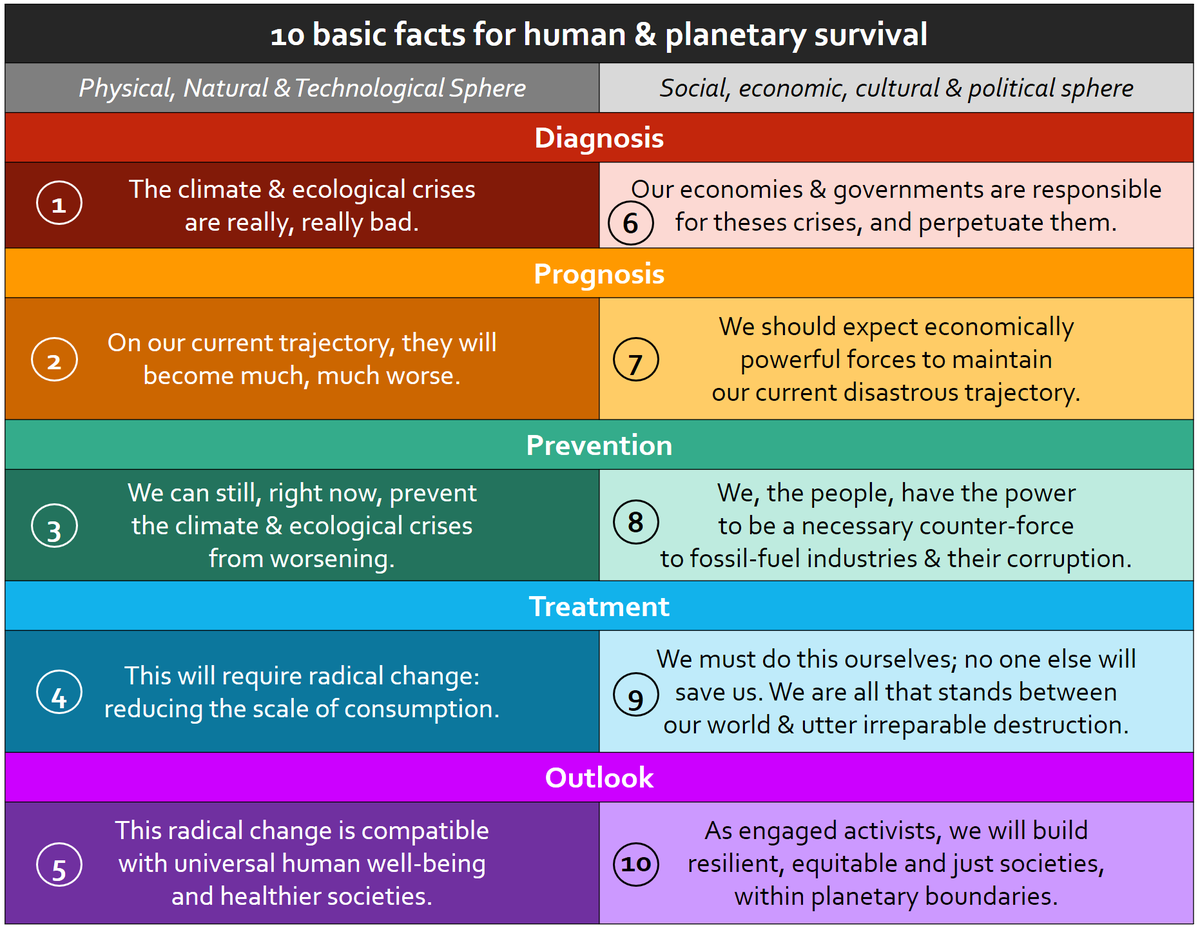
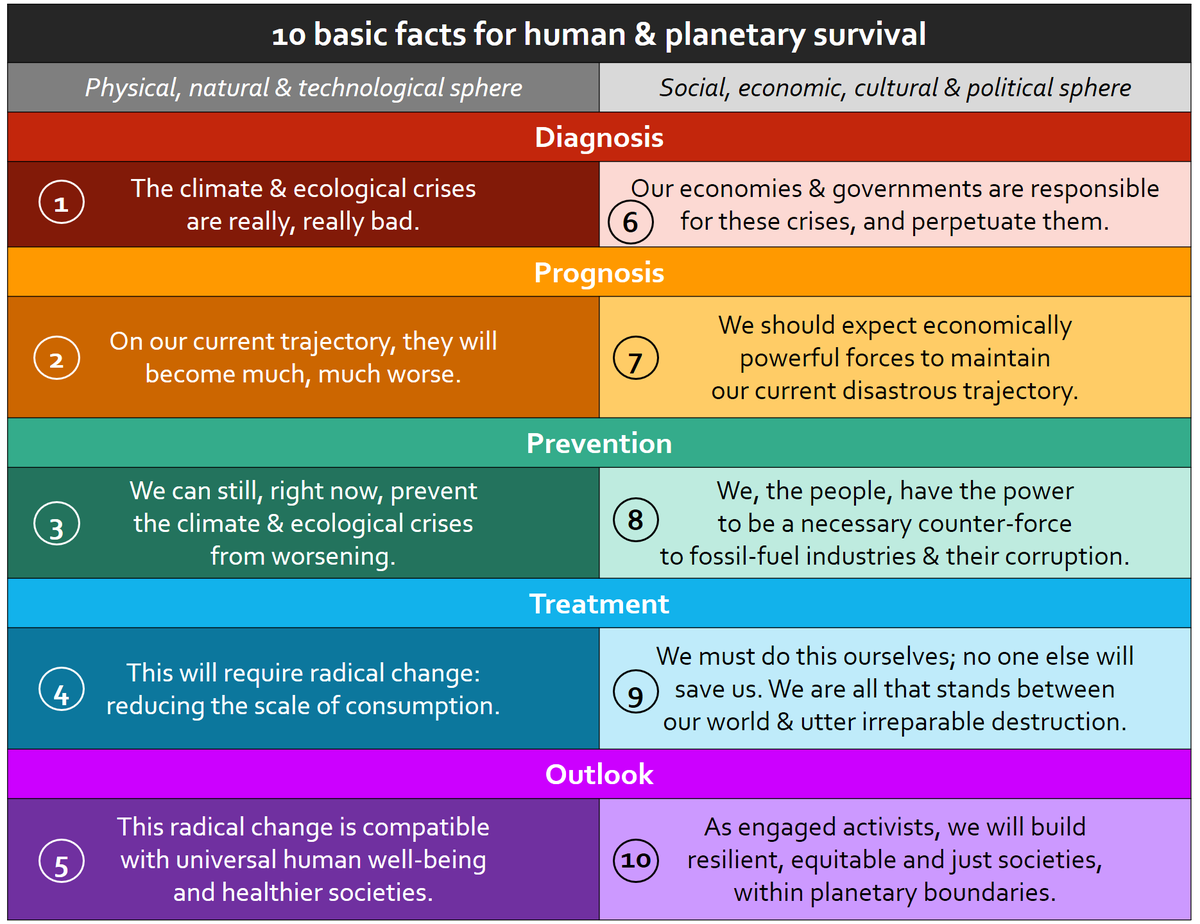
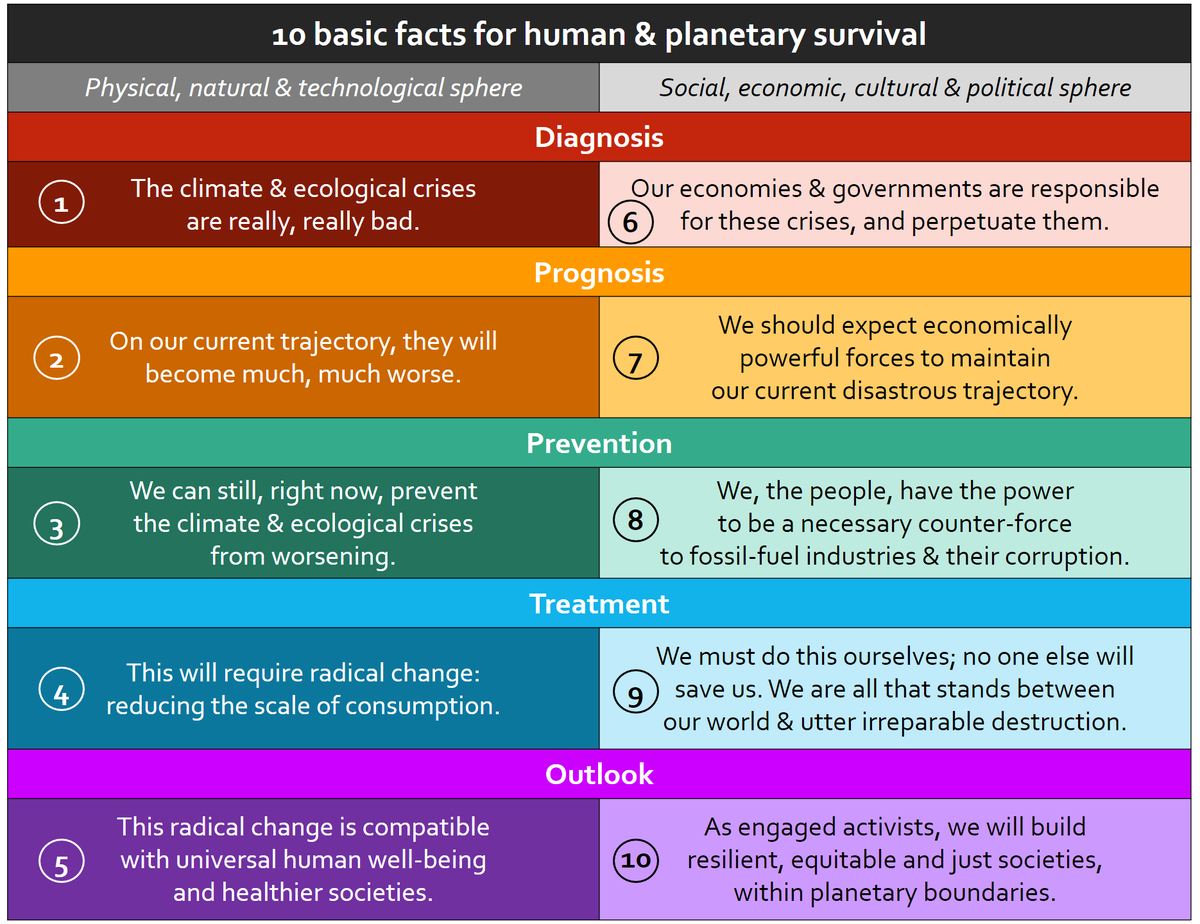
 Future projections are given by the same reports as above. They are extremely, extremely worrying. Dire. Awful. Not. Good. 3/ [I'm going to keep posting the diagram so I don't have to copy-paste the text and you don't forget what the numbers mean. Sorry if it's repetitive.](2) Future projections are given by the same reports as above. They are extremely, extremely worrying. Dire. Awful. Not. Good. 3/](https://pbs.twimg.com/media/ENa5bmXXsAAC8KF.png)
